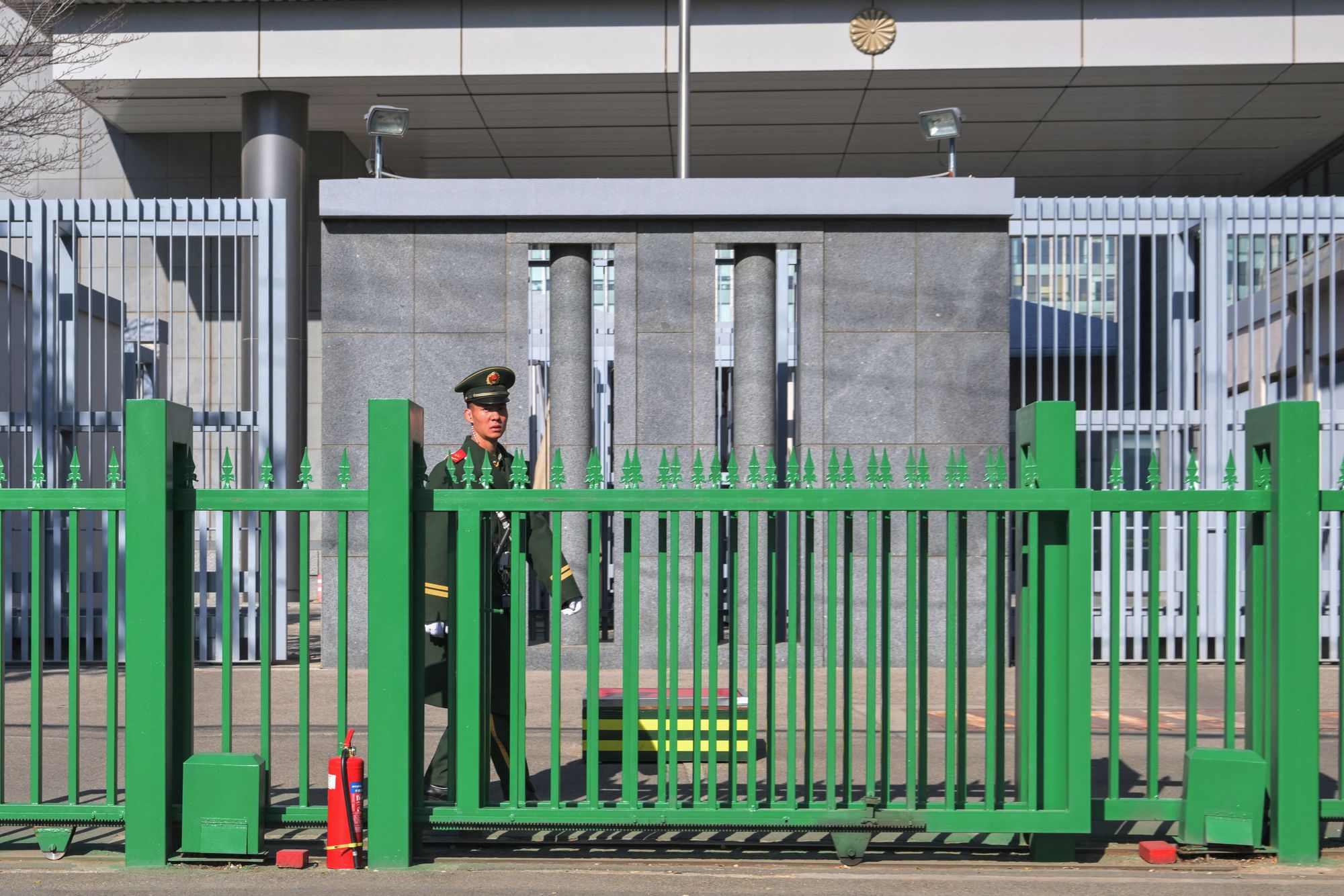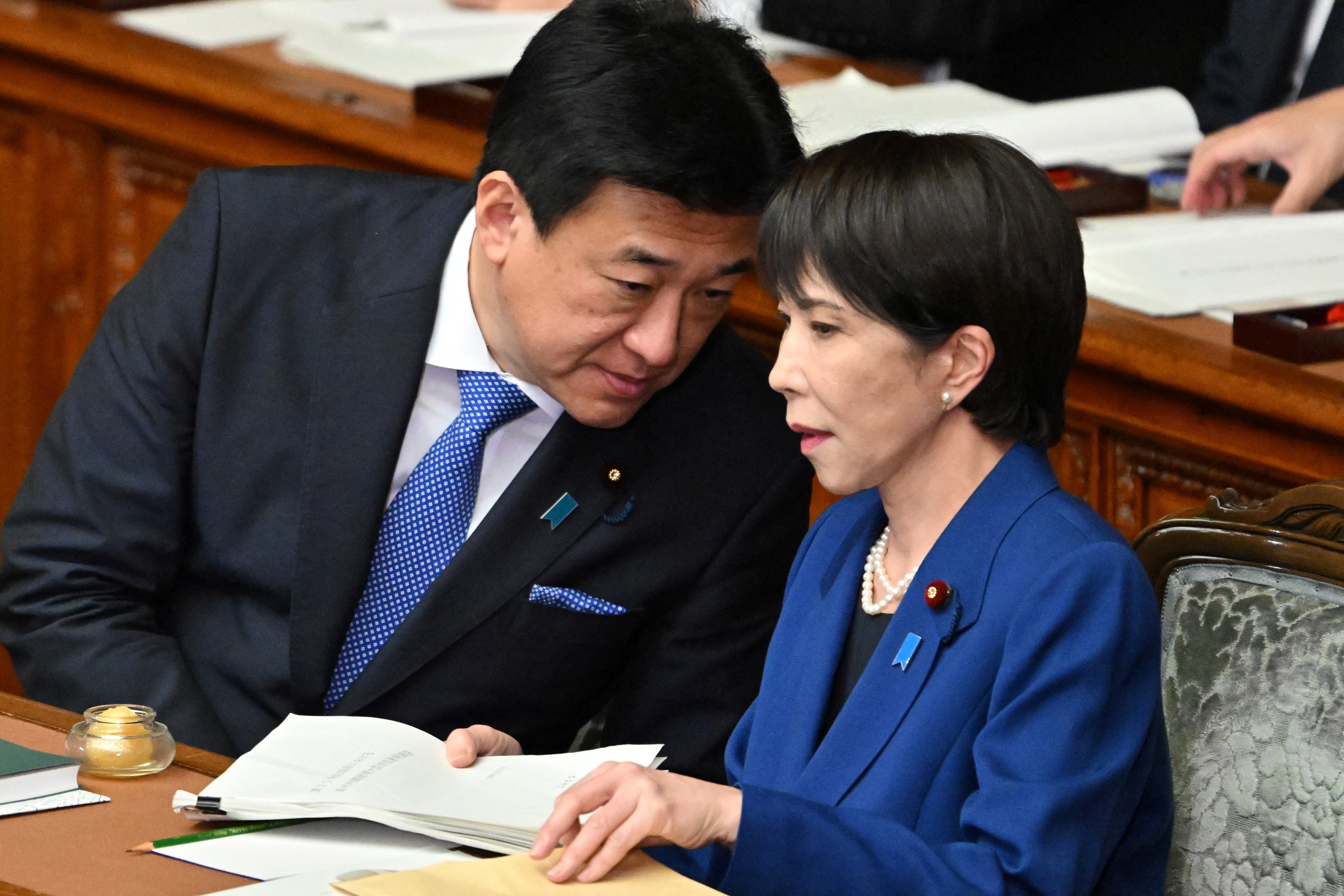China summoned Japan’s ambassador in Beijing amid an ongoing row over Sanae Takaichi’s remarks suggesting that an attack on Taiwan could trigger a Japanese military response.
Beijing and Tokyo have traded protests throughout the week in a dispute that has revived longstanding tensions between the two Asian neighbours and underscored China’s sensitivity over Taiwan, the self-governed island it claims as its territory.
The row began at a Japanese parliamentary committee last week, when an opposition MP pressed Ms Takaichi on what kind of situation around Taiwan might constitute a threat to Japan’s survival.
“If there are battleships and the use of force, no matter how you think about it, it could constitute a survival-threatening situation,” she replied.
Under Japan’s 2015 security legislation, a “survival-threatening situation” is a defined legal category that allows the country’s self-defence forces to operate if an attack on a close partner – typically understood to mean the United States – poses an existential danger to Japan.

Tokyo has historically avoided stating how it might respond in a Taiwan conflict, maintaining a form of strategic ambiguity similar to that practised by Washington.
Beijing denounced Ms Takaichi’s comments as “egregious”.
The backlash intensified after Xue Jian, China’s consul general in Osaka, reposted an article on X (formerly Twitter) alongside his own message that “the dirty head that sticks itself in must be cut off”.
Japan’s chief cabinet secretary Minoru Kihara said the intent of the remark “may not be clear” but called it “highly inappropriate”. Tokyo lodged a formal protest, and Beijing counter-protested over Ms Takaichi’s statement.

Although the Osaka consul’s post was later removed, Ms Takaichi declined on Tuesday to retract her comments, saying they were “consistent with the government’s traditional position”, while adding that she would avoid hypothetical scenarios in future.
China escalated its response on Thursday.
Its foreign ministry warned in Japanese and English that Japan should “stop playing with fire”, calling any intervention in the Taiwan Strait an “act of aggression”.
Vice foreign minister Sun Weidong then summoned ambassador Kenji Kanasugi, accusing Ms Takaichi’s remarks of being “extremely wrong and dangerous” and demanding they be withdrawn. State media quoted Mr Sun as saying that “otherwise all consequences must be borne by Japan”.
According to Mr Kihara, Ambassador Kanasugi told Chinese officials that Japan’s stance “has not changed” and emphasised Tokyo’s position that issues concerning Taiwan should be resolved peacefully. He also raised Japan’s objection to the Osaka consul’s post, describing it as “extremely inappropriate”.
China’s statement, released through the foreign ministry and the official Xinhua news agency, linked the dispute to historical grievances.
Mr Sun said Ms Takaichi’s comments violated international norms, damaged the post-war order and seriously hurt the feelings of the Chinese people, reported Xinhua News.
According to the outlet, he warned that Taiwan was the core of China’s core interests and an untouchable red line, asserting that the 1.4 billion Chinese people will never tolerate this.
The nationalist tone was echoed by state media.
The Communist Party’s People’s Daily called Ms Takaichi the first Japanese leader in 80 years to threaten the use of force against China, describing her stance as “extremely sinister”.
China’s military reposted the foreign ministry’s warning on its official accounts in several languages, including Japanese.
Ms Takaichi, a protégé of the late prime minister Shinzo Abe, is known for her hawkish views on China and longstanding support for Taiwan.
Earlier this year she met Taiwan’s president, Lai Ching-te, in Taipei and said in October, after taking office, that “Taiwan is an crucial partner and important friend”. She has previously argued that a blockade or invasion of the island could directly threaten Japan.
Relations between the two countries had recently shown signs of stabilising after China relaxed restrictions on Japanese seafood imports and president Xi Jinping met Ms Takaichi at a regional summit in South Korea. Ambassador Kanasugi echoed that conciliatory tone on Thursday, saying that despite “ups and downs” the two neighbours should manage their disagreements.
But the latest dispute reflects how quickly tensions can surge. China views Taiwan as an internal matter and has not ruled out the use of force to bring it under its control. Japan, situated close to Taiwan and home to major US military bases, is increasingly vocal about the island’s importance to its own security.
Japan’s foreign minister Toshimitsu Motegi said on Friday there was no need for Ms Takaichi to retract her remarks. “Our explanation of our security legislation and what a ‘survival-threatening situation’ is is very clear,” he said, reported Bloomberg. “It does not in any way violate any international law.”
Nicholas Burns, former US ambassador to China, told Bloomberg TV that the Osaka consul’s message was “absolutely reprehensible”, adding that Japan’s proximity to Taiwan meant it would inevitably be concerned about developments there.
Japan’s new prime minister sleeps two hours a night and asks aides to meet at 3am
World’s first Pokémon theme park to open next year in Japan
China uses ‘robot wolves’ in staged beach invasion as it tests new war tactic
Thailand’s king makes historic first visit to China
Court rejects appeal by veteran Chinese journalist jailed for spying
How Sanae Takaichi’s Taiwan remark sparked a diplomatic row between Japan and China







